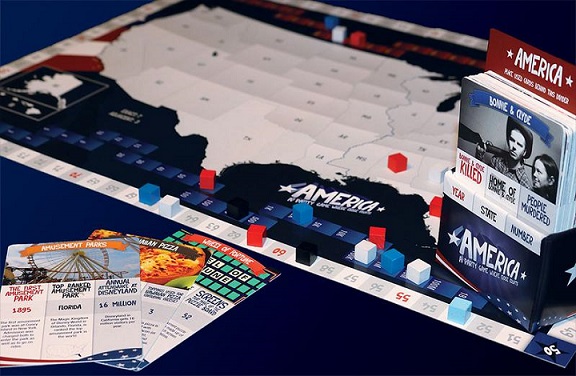Take Your Best Guess in America: A Party Game Where Close Counts

Self-dubbed "a party game where close counts," America doesn’t expect you to know all the answers — you just need to have a general idea, or guess that no one else has a clue either.
So, how well do you know America?
Gameplay
The board is set in the middle of the table. On it there is a map of the United States, a timeline with spaces numbered with various years, and a number line with numbered spaces starting at zero and going up to one billion.
Each player takes five player markers. There is also a box of question cards. Each question card has a topic (such as apple pie, a famous battle, or a well-known American book) and three questions related to it. One question is about a location, another one a year, and the last one a number. Players take turns being the active player. The active player looks at the side of the card that is visible in the front of the box and the card in the back of the box and chooses which subject they would like, then reads aloud the questions.
Players then take turns placing one marker at a time onto the board. You may attempt to answer any of the three questions by placing your marker on the appropriate spot. For example, one question might be "When was Benjamin Franklin born?" and you would place your marker on the year on the timeline that you think is correct. While not every year is listed on the board, each space encompasses the year printed on that space all the way up to the year printed on the next space (the same applies for the numbers line). So if you wanted to guess 1706, you would place your marker on 1705. For each question on the card you may make multiple guesses, so you could place one marker on 1705 and one on 1710. But two markers may never be on the same space.
After players have used as many of the markers as they wish, the answers are revealed. For any markers correctly placed, you win 7 points and the marker you used is returned to you. If you placed a marker on a space adjacent to the correct answer, you get three points and you also get your marker back. If you thought no one had the correct answer, for each question you could also use a marker to guess that no one had the correct answer or were adjacent to the correct answer. If you're right you earn 7 points. If you just guessed that no one had the exact answer and you're right, you earn 3 points.
All incorrect markers are set aside in a pool. If one of your markers is in the pool at the end of the round, you may take one back. The card used that round is then placed behind the divider in the middle of the box in such a way that the next time it works its way to the front, the opposite site of the card will be visible, which will have its own subject and questions.
The player with the most points after six cards have been answered wins the game.

Review
America has a wide range of question categories. Popular culture is covered, as well as history, literature, business, and more. Each answer also comes with a few lines of information and you learn some neat facts along the way (did you know three billion pizzas are eaten in the US every year?).
The gameplay is also quite easy to learn. The question of which states are technically adjacent might have been tricky, but for any ambiguous instances the rulebook clarifies. There are also some slight push-your-luck elements to the game since the more false guesses you make, the fewer tokens you have next round; though it’s worth noting that the game does not allow you to ever have less than three at the start of a round.
America’s strongest aspect is that it is a trivia game that everyone can play regardless of how much trivia knowledge they actually have. Guessing is made more viable by the fact that getting close still scores you points, and since markers are placed one at a time you can also use your opponent’s guesses to narrow down your choices.
The ‘close enough’ aspect of the game might lose players who are huge trivia fans, but it also opens it up to being fun for more players, making it a great party game. Also, if you’re not American you might be at a disadvantage, even if it is a game designed to be playable by people who aren’t great at trivia. But between its accessible gameplay and simple rules, America is a very solid party game.
Pros: An accessible trivia game, wide range of questions
Cons: Potentially more difficult for non-Americans, some trivia fans will not enjoy the ‘close enough’ mechanics
Disclosure: we received a complimentary review copy of this game.







